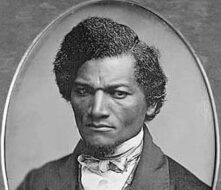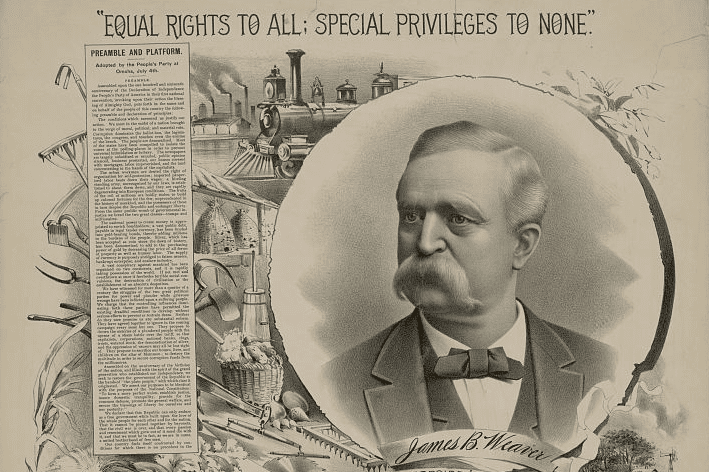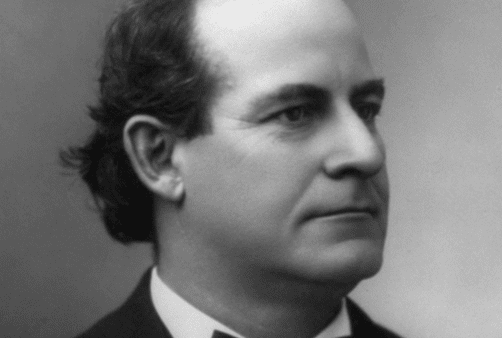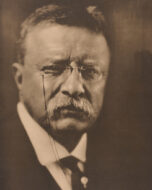


Introduction
Woodrow Wilson (1856–1924) was a well-established academic before he became president of the United States. He earned a Ph.D. in political science from Johns Hopkins University and published many books and articles on American politics before entering public life. As a senior at Princeton, Wilson published this article, “Cabinet Government in the United States,” calling for a much closer relationship between the legislative and executive branches than was permitted by the Constitution (see Federalist No. 48, Federalist No. 51, House Debate on the Establishment of Post Roads and House Debate on the Influence of Alexander Hamilton).
This would be the first of many criticisms Wilson would offer of the Constitution’s separation of powers. Much of Wilson’s critique is aimed at the Congressional committee system, whereby standing or permanent committees with a settled jurisdiction (agricultural policy, foreign affairs, and so forth) handle the bulk of the initial legislative work on their areas of expertise. Committee government, Wilson argued, sacrificed discussion and open debate for specialization and efficiency. Instead of engaging in debates about ideas on the floor of the House and Senate, Congress accomplished most of its work in committees that were closed to the public. Moreover, dividing power internally among committees prevented coordination between the legislative and executive branches, which produced a less responsive government. Wilson envisioned a cabinet-style system that would allow the legislature to accomplish its tasks, but also to engage in real debate that would engage and educate the public, similar to how the British parliament works today.
Source: Thomas W. (Woodrow) Wilson, “Cabinet Government in the United States,” International Review, August 1879.
Our patriotism seems of late to have been exchanging its wonted[1] tone of confident hope for one of desponding solicitude. Anxiety about the future of our institutions seems to be daily becoming stronger in the minds of thoughtful Americans. A feeling of uneasiness is undoubtedly prevalent, sometimes taking the shape of a fear that grave, perhaps radical, defects in our mode of government are militating against our liberty and prosperity. A marked and alarming decline in statesmanship, a rule of levity and folly instead of wisdom and sober forethought in legislation, threaten to shake our trust not only in the men by whom our national policy is controlled, but also in the very principles upon which our Government rests. . . .
What is the real cause of this solicitude and doubt? It is, in our opinion, to be found in the absorption of all power by a legislature which is practically irresponsible for its acts. But even this would not necessarily be harmful, were it not for the addition of a despotic principle which it is my present purpose to consider.
At its highest development, representative government is that form which best enables a free people to govern themselves. The main object of a representative assembly, therefore, should be the discussion of public business. They should legislate as if in the presence of the whole country, because they come under the closest scrutiny and fullest criticism of all the representatives of the country speaking in open and free debate. Only in such an assembly, only in such an atmosphere of publicity, only by means of such a vast investigating machine, can the different sections of a great country learn each other’s feelings and interests. It is not enough that the general course of legislation is known to all. Unless during its progress it is subjected to a thorough, even a tediously prolonged, process of public sifting, to the free comment of friend and foe alike, to the ordeal of battle among those upon whose vote its fate depends, an act of open legislation may have its real intent and scope completely concealed by its friends and undiscovered by its enemies, and it may be as fatally mischievous as the darkest measures of an oligarchy or a despot. Nothing can be more obvious than the fact that the very life of free, popular institutions is dependent upon their breathing the bracing air of thorough, exhaustive, and open discussions, or that select Congressional committees, whose proceedings must from their very nature be secret, are, as means of legislation, dangerous and unwholesome.
. . . Congress is a deliberative body in which there is little real deliberation; a legislature which legislates with no real discussion of its business. Our government is practically carried on by irresponsible committees. Too few Americans take the trouble to inform themselves as to the methods of Congressional management; and, as a consequence, not many have perceived that almost absolute power has fallen into the hands of men whose irresponsibility prevents the regulation of their conduct by the people from whom they derive their authority. The most important, most powerful man in the government of the United States in time of peace is the Speaker of the House of Representatives. Instead of being merely an executive officer, whose principal duties are those immediately connected with the administration of the rules of order, he is a potent party chief, the only chief of any real potency,—and must of necessity be so. He must be the strongest and shrewdest member of his party in the lower House; for almost all the real business of that House is transacted by committees whose members are his nominees. Unless the rules of the House be suspended by a special two-thirds vote, every bill introduced must be referred, without debate, to the proper Standing Committee,[2] with whom rests the privilege of embodying it, or any part of it, in their reports, or of rejecting it altogether. The House very seldom takes any direct action upon any measures introduced by individual members; its votes and discussions are almost entirely confined to committee reports and committee dictation. The whole attitude of business depends upon forty-seven Standing Committees. . . .
This is certainly a phase of representative government peculiar to ourselves. And yet its development was most natural and apparently necessary. It is hardly possible for a body of several hundred men, without official or authoritative leaders, to determine upon any line of action without interminable wrangling and delays injurious to the interests under their care. Left to their own resources, they would be as helpless as any other mass meeting. Without leaders having authority to guide their deliberations and give a definite direction to the movement of legislation; and, moreover, with none of that sense of responsibility which constantly rests upon those whose duty it is to work out to a successful issue the policies which they themselves originate, yet with full power to dictate policies which others must carry into execution,—a recognition of the need of some sort of leadership, and of a division of labor, led to the formation of these Standing Committees, to which are entrusted the shaping of the national policy in the several departments of administration, as well as the prerogatives of the initiative in legislation and leadership in debate. When theoretically viewed, this is an ingenious and apparently harmless devise, but one which, in practice, subverts that most fundamental of all the principles of a free state,—the right of the people to a potential voice in their own government. Great measures of legislation are discussed and determined, not conspicuously in public session of the people’s representatives, but in the unapproachable privacy of committee rooms.[3]
But what less imperfect means of representative government can we find without stepping beyond the bounds of a true republicanism? Certainly none other than those which were rejected by the Constitutional Convention. When the Convention of 1787, upon the submission of the report of the Committee of Detail, came to consider the respective duties and privileges of the legislative and executive departments, and the relations which these two branches of the Government should sustain towards each other, many serious questions presented themselves for solution. One of the gravest of these was, whether or not the interests of the public service would be furthered by allowing some of the higher officers of state to occupy seats in the legislature. The propriety and practical advantage of such a course were obviously suggested by a similar arrangement under the British Constitution, to which our political fathers often and wisely looked for useful hints. But since the spheres of the several departments were in the end defined with all the clearness, strictness, and care possible to a written instrument, the opinion prevailed among the members of the Convention that it would be inadvisable to establish any such connection between the Executive and Congress. . . .
In short, the framers of the Constitution, in endeavoring to act in accordance with the principle of Montesquieu’s celebrated and unquestionably just political maxim—that the legislative, executive, and judicial departments of a free state should be separate,—separate,—made their separation so complete as to amount to isolation. To the methods of representative government which have sprung from these provisions of the Constitution, by which the Convention thought so carefully to guard and limit the powers of the legislature, we must look for an explanation, in a large measure, of the evils over which we now find ourselves lamenting.
What, then, is Cabinet government? What is the change proposed? Simply to give to the heads of the Executive departments—the members of the Cabinet—seats in Congress, with the privilege of the initiative in legislation and some part of the unbounded privileges now commanded by the Standing Committees. . . . Their functions would be peculiar. They would constitute a link between the legislative and executive branches of the general government, and, as representatives of the Executive, must hold the right of the initiative in legislation. . . .
But, to give the president the right to choose whomsoever he pleases as his constitutional advisers, after having constituted Cabinet officers ex officio members of Congress, would be to empower him to appoint a limited number of representatives, and would thus be plainly at variance with republican principles. The highest order of responsible government could, then, be established in the United States only by laying upon the president the necessity of selecting his Cabinet from among the number of representatives already chosen by the people, or by the legislatures of the states.
Such a change in our legislative system would not be so radical as it might at first appear: it would certainly be very far from revolutionary. Under our present system we suffer all the inconveniences, are hampered by all that is defective in the machinery, of responsible government, without securing any of the many benefits which would follow upon its complete establishment. Cabinet officers are now appointed only with the consent of the Senate. Such powers as a Cabinet with responsible leadership must possess are now divided among the forty-seven Standing Committees, whose prerogatives of irresponsible leadership savor of despotism, because exercised for the most part within the secret precincts of a committee room, and not under the eyes of the whole House, and thus of the whole country. . . .
We are thus again brought into the presence of the cardinal fact of this discussion,—that debate is the essential function of a popular representative body. In the severe, distinct, and sharp enunciation of underlying principles, the unsparing examination and telling criticism of opposite positions, the careful, painstaking unraveling of all the issues involved, which are incident to the free discussion of questions of public policy we see the best, the only effective, means of educating public opinion. . . . It is perhaps safe to say, that the Government which secures the most thorough discussions of public interests,—whose administration most nearly conforms to the opinions of the governed,—is the freest and the best. And certainly, when judged by this principle, government by irresponsible Standing Committees can bear no comparison with government by means of a responsible ministry. . . .
But, above and beyond all this, a responsible Cabinet constitutes a link between the executive and legislative departments of the Government which experience declares in the clearest tones to be absolutely necessary in a well-regulated, well-proportioned body politic. None can so well judge of the perfections or imperfections of a law as those who have to administer it. Look, for example, at the important matter of taxation. The only legitimate object of taxation is the support of Government; and who can so well determine the requisite revenue as those who conduct the Government? Who can so well choose feasible means of taxation, available sources of revenue, as those who have to meet the practical difficulties of tax-collection? And what surer guarantee against exorbitant estimates and unwise taxation than the necessity of full explanation and defense before the whole House? The same principles, of course, apply to all legislation upon matters connected with any of the Executive departments.
Thus, then, not only can Cabinet ministers meet the needs of their departments more adequately and understandingly and conduct their administration better than can irresponsible committees, but they are also less liable to misuse their powers. Responsible ministers must secure from the House and Senate an intelligent, thorough, and practical treatment of their affairs; must vindicate their principles in open battle on the floor of Congress. The public is thus enabled to exercise a direct scrutiny over the workings of the Executive departments, to keep all their operations under a constant stream of daylight. Ministers could do nothing under the shadow of darkness; committees do all in the dark. It can easily be seen how constantly ministers would be plied with questions about the conduct of public affairs, and how necessary it would be for them to satisfy their questioners if they did not wish to fall under suspicion, distrust, and obloquy[4].
- 1. usual
- 2. These are complemented by select committees, which are temporarily formed for specific purposes. Standing committees exerted significant influence in the mid-nineteenth century Congress, and still do so today. Standing committees are permanent committees that have a settled jurisdiction, such as agricultural policy, foreign affairs, and so forth.
- 3. Committee hearings were generally closed to the public, without any public record of debates and proceedings, until well into the twentieth century.
- 4. public suspicion or abuse

Conversation-based seminars for collegial PD, one-day and multi-day seminars, graduate credit seminars (MA degree), online and in-person.

































































































